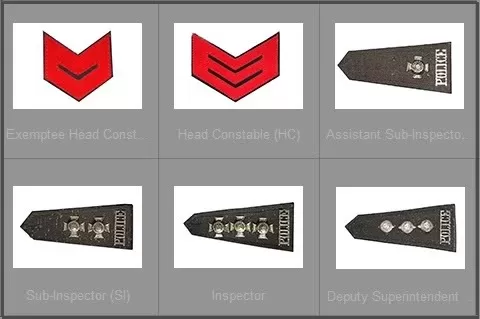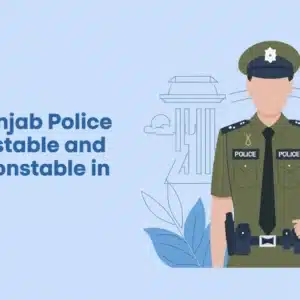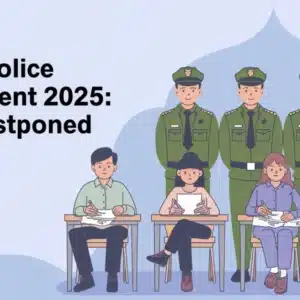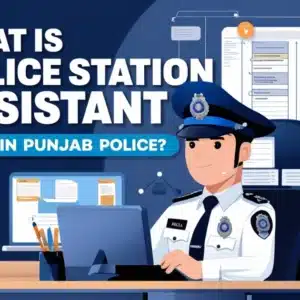When you think of the Punjab Police Ranks in Pakistan, you might picture officers patrolling the streets or managing traffic, but behind those uniforms lies a well-organized hierarchy of ranks that keeps the system running smoothly. These ranks aren’t just titles—they define authority, responsibility, and even salary through the Pakistan Civil Service (BPS) grading system, a framework that classifies government jobs based on duty and pay.
Whether you’re curious about the lowest rank in Punjab Police or wondering how someone climbs to the top, this guide breaks it all down for you. The Punjab Police is the backbone of law enforcement in Punjab, Pakistan’s most populous province. With roots stretching back to British colonial times, its rank structure has evolved into a clear system split into junior ranks (like Constables) and senior ranks (up to the Inspector General).
Each level comes with specific duties, qualifications, and even shoulder badges that signal an officer’s place in the chain. Let’s explore this Punjab Police rank structure explained, from the ground up, and see what it takes to rise through the ranks.
Punjab Police Ranks With Basic Pay Scale
At its core, the Punjab Police hierarchy ensures order and efficiency. Imagine it like a ladder: every step up means more responsibility, from patrolling neighborhoods to overseeing entire regions. The Basic Pay Scale (BPS) ties each rank to a grade—think of it as a salary and status marker. For example, a Constable starts at BPS-07, while the top boss, the Inspector General of Police (IGP), sits at BPS-22.
Here’s a quick Punjab Police ranks overview:
- Junior Ranks: Constable to Inspector—your everyday officers on the beat.
- Senior Ranks: Assistant/Deputy Superintendent of Police (ASP/DSP) to IGP—the leaders steering the ship.
Why does this matter? A clear hierarchy of ranks lets officers know who’s in charge and keeps the force disciplined, whether they’re tackling crime or helping the community.
| Rank | Abbreviation | Grade |
|---|---|---|
| Constable | C | BS 07 |
| Head Constable | HC | BS 09 |
| Assistant Sub Inspector | ASI | BS 11 |
| Sub Inspector | SI | BS 14 |
| Police Inspector | IP | BS 16 |
| Assistant/Deputy Superintendent of Police | ASP/DSP | BS 17 |
| Superintendent Of Police | SP | BS 18 |
| Senior Superintendent of Police | SSP | BS 19 |
| Deputy Inspector General | DIG | BS 20 |
| Additional Inspector General | AIG | BS 21 |
| Inspector General of Police | IG/IGP | BS 22 |
Punjab Police Ranks List: Low to High
Let’s dive into the list of Punjab Police ranks in order, starting with the boots on the ground and ending with the big decision-makers. I’ve included their BPS grades, key duties, and what it takes to get there—because who doesn’t want to know the best way to achieve higher ranks in Punjab Police?
Also Read: Punjab Police Online FIR Check by CNIC in Pakistan: Best Guide
Junior Ranks: The Foundation
- Constable (C) – BPS-07
- What They Do: These are the foot soldiers—think patrolling streets, responding to emergencies, or directing traffic. They’re the lowest rank in Punjab Police, but they’re vital.
- How to Join: A matriculation certificate (10th grade) and a stint at the Police Training School get you in.
- Pay & Perks: Around PKR 35,000–40,000 monthly to start, plus benefits like health coverage.
- Head Constable (HC) – BPS-09
- What They Do: A step up, Head Constables supervise Constables and assist higher-ups, often leading small teams on patrol.
- Eligibility: Five years as a Constable, plus training, earns you this spot.
- Insight: They’re the glue between the ranks—experienced but still in the field. No direct recruitment of HC’s, they get promoted from Constable rank.
- Assistant Sub-Inspector (ASI) – BPS-11
- What They Do: ASIs dig into investigations—think crime scenes and suspect interviews—while supporting senior officers.
- Qualifications: Five years as a Head Constable and a clean service record.
- Sub-Inspector (SI) – BPS-14
- What They Do: SIs manage police stations and lead investigations. Ever heard of an SHO? That’s often a Sub-Inspector (more on that in the FAQs).
- Pathway: Another five years as an ASI, plus training.
- Inspector (IP) – BPS-16
- What They Do: The top of the junior tier, Inspectors oversee stations, guide lower ranks, and handle bigger cases.
- Requirements: Five years as an SI and a knack for leadership.
Senior Ranks: The Commanders
- Assistant/Deputy Superintendent of Police (ASP/DSP) – BPS-17
- What They Do: These 17-grade officers in Pakistan run police stations or districts, diving into serious investigations and keeping order.
- How to Get There: A bachelor’s degree and passing the CSS exam (for ASPs) or years of service (for DSPs promoted from Inspector).
- Fun Fact: ASPs are often fresh recruits from the elite Civil Services, while DSPs might have climbed the ranks.
- Superintendent of Police (SP) – BPS-18
- What They Do: An SP oversees multiple stations or a district, ensuring everything runs like clockwork.
- Grade of SP: BPS-18, with a salary around PKR 150,000–200,000.
- Criteria: About 10 years as an ASP/DSP, plus proven skills.
- Senior Superintendent of Police (SSP) – BPS-19
- What They Do: SSPs manage entire ranges or districts, balancing admin work with law enforcement.
- Eligibility: 15 years of service, often starting as an ASP/DSP.
- Deputy Inspector General (DIG) – BPS-20
- What They Do: DIGs handle regions, coordinating districts and tackling big-picture issues like organized crime.
- Path: 20 years of climbing, with a bachelor’s degree as the foundation.
- Additional Inspector General (AIG) – BPS-21
- What They Do: AIGs oversee specialized wings—think traffic or the Criminal Investigation Department.
- Requirements: 25 years of service and a stellar record.
- Inspector General of Police (IGP) – BPS-22
- What They Do: The IGP is the boss of the entire Punjab Police, setting policies and managing resources province-wide.
- Qualifications: 30+ years of service, often handpicked by the government.
- Salary: Well into the PKR 400,000+ range, plus perks like official vehicles.
Also Read: How to File A Lost Report in Pakistan?
Punjab Police Ranks and Salaries in Pakistan (2024)
Money matters, right? Here’s a snapshot of Punjab Police ranks and salaries 2024:
- Constable (BPS-07): PKR 35,000–40,000 (on joining).
- SI (BPS-14): PKR 60,000–80,000 (on joining).
- SP (BPS-18): PKR 150,000–200,000.
- IGP (BPS-22): PKR 400,000+.
These figures come from government pay scales and can rise with allowances like hazardous duty pay—because policing isn’t always a desk job.
Punjab Police Ranks and Badges: What’s on the Shoulder?
Ever noticed those stars or insignia on an officer’s uniform? Those Punjab Police ranks with stars tell you who’s who. Here’s a peek:
- Constable: No stars, just a simple badge.
- Inspector: Three stars.
- SP: A star with a crescent.
- IGP: Crossed sword and baton with a wreath—top-tier stuff.
These ranks and badges aren’t just for show—they signal authority and help the public (and other officers) know who’s in charge.

Punjab Police Junior Rank Shoulder Badges

How to Join Punjab Police at Different Ranks
Curious about how to join Punjab Police at different ranks? It depends on where you start:
- Constable: Pass matric, clear a physical test, and complete basic training at a police academy.
- ASP: Crack the competitive CSS exam, then train at the National Police Academy.
- Promotion: For ranks like SI or DSP, it’s about years of service, performance, and passing internal exams—check out the best books for Punjab Police ranks syllabus like “Police Rules 1934” for prep.
The Punjab Police promotion criteria for ranks hinge on experience, training, and sometimes a bit of luck—like getting noticed for bravery.
Punjab Police Ranks and Responsibilities
Every rank has its role:
- Junior Officers: Patrols, traffic control, and small investigations.
- Senior Officers: Strategy, resource management, and tackling major crimes like those handled by the Anti-Narcotics Unit.
The difference between Punjab Police ranks lies in scope—Constables focus on the streets, while DIGs shape entire regions.
Why It All Matters
The Punjab Police ranks hierarchy chart isn’t just bureaucracy—it’s how law enforcement stays effective. From the Beat Constable keeping your neighborhood safe to the IGP crafting policies, each level builds a system that’s been refined over decades. Fun fact: the BPS system dates back to colonial admin reforms, adapted today for modern policing.
Want more? The Punjab Police website and annual reports offer deeper dives into stats and roles—great for anyone researching Punjab Police ranks information.
Conclusion
The Punjab Police ranks are more than a ladder of titles—they’re a blueprint for maintaining order across Pakistan’s biggest province. Tied to the BPS grades, these ranks define who does what, from the Police Constable on patrol to the Inspector General of Police calling the shots. Whether you’re exploring a career path or just curious about the Punjab Police ranks and their powers, this structure keeps the force ticking—and the public safe.
Frequently Asked Questions (FAQs)
What is the rank of SHO in Punjab Police?
The Station House Officer (SHO) is typically a Sub-Inspector (SI), though in bigger stations, an Inspector might take the role. They run the show at a police station.
What are the ranks in the police from lowest to highest?
From bottom to top: Constable, Head Constable, ASI, SI, Inspector, ASP/DSP, SP, SSP, DIG, AIG, IGP.
What is the lowest rank in Punjab Police?
That’s the Constable (BPS-07)—the entry point for most officers.
What is the grade of SP?
The Superintendent of Police sits at BPS-18.
Who is the 17-grade officer in Pakistan?
In the Punjab Police, that’s the ASP or DSP—both are BPS-17.
What is the rank of DSP?
The Deputy Superintendent of Police (DSP) is a senior rank at BPS-17, often managing stations or districts.





The links you included were super helpful. Thanks for the resources.